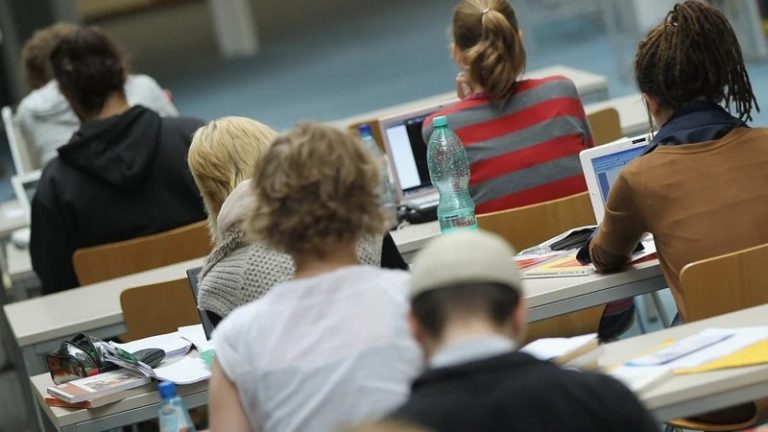Solidarity- People Before Profit Dáil motion calls for a removal of all barriers to further and higher education- including all fees, leaving cert and other barriers
Rationing of access to third level education- utter archaic and perpetuates inequality
On Thursday, in the Dáil, Solidarity- People Before Profit’s private members motion on Access to Further and Higher Education will be debated.
The motion calls for a radical reform of access to third level education, including abolishing the leaving cert, scrapping all third level fees and investing in extra third level places so everyone can access the course or apprenticeship of their choice.
The motion calls for all the other barriers to third level to be abolished including investing in counselling and mental health supports, funding for a proper grants system to cover the real cost of education including textbooks and IT. In addition, People Before Profit is supporting a move to publicly built, publicly owned, genuinely affordable accommodation for all students.
The motion has been drawn up after consultation with student unions and student activists from across the country.
Speaking on the motion, Richard Boyd Barrett TD, said: “This motion that we have put before the Dáil calls for the tearing down of all barriers to further and higher education.
“It would be totally preposterous to ration access to primary and secondary education, so why would we continue to persist with the rationing of further and higher education and an exam system, the leaving cert, which places a huge burden on students, and is archaic and of a bygone age.
“Access to college and to third level presents students with enormous barriers in terms of fees and other financial burdens. This has to stop, and we have to move to a system where we are making further and higher education accessible to as many people as possible.
“After all that people have gone through in the pandemic, it is now payback time for young people and for our society. One part of this is the total removal of barriers to access to further and higher education- which is what this motion would do.”
Solidarity TD, Mick Barry, said: “”It is increasingly clear that the CAO points race is more competitive this year than ever before. Students are being pitted against each other in a race for a limited number of college places. This would be wrong at any time, but it is especially wrong in a pandemic year. This injustice can only be dealt with by changing Government policy and adopting instead a policy of open access to third level education. Just as the doors of second level were flung open more than 50 years ago so too must the doors of third level be flung open today.
“A positive consequence of such a policy would be the abolition of the Leaving Cert exam which is out-of-date, unnecessarily stressful and biased against students from lower income households and students who are not neurotypical. There is no question but that open access will require a lot of funding and investment so we would advocate serious wealth taxes as a good place to start the debate on how to make this dream a reality.”
Notes to Editors:
Richard Boyd Barrett TD will be speaking today on the Q&A with the Minister for Further and Higher Education- a debate that was specifically asked for by People Before Profit reps on the Business Committee.
People Before Profit motion which is to be debated Thursday 11 March
Dáil Eireann notes that
– Covid 19 and public health restrictions have imposed significant hardship and sacrifice on young people, students and all those in education, seriously diminishing the educational experience and negatively impacting on mental health and general wellbeing;
– Even before the Covid pandemic, this cohort of people faced very significant stresses and hardships including:
o the serious stress and anxiety among students generated by the Leaving Certificate and intense competition for access to apprenticeships or places in the further and higher education courses of their choice;
o an unacceptable level of social inequality in access to third level education where for example 99% of young people living in Dublin 6 go on to higher education while only 16% of those from Dublin 10 continue in education after school;
o widespread poverty and financial hardship among many 3rd level students, particularly because of extortionate rents for accommodation in both purpose built student accommodation and the wider rental sector;
o the financial hardship imposed on many undergraduate students and their families by having to pay €3000 per year in registration fees and a full cost of up to €7000 for many, the highest across the EU;
o the inadequacy of the SUSI grants system where too many students are ineligible and they grants do not cover the full costs of education;
o the significant additional costs of third level education also includes text books that often must be bought new, IT, vaccines for those training in the health professions, uniforms, travel and transport etc;
o many groups of students having to work without pay on placements, including student nurses and midwives, social care students, allied healthcare trainees and others;
o an alarmingly high number of students suffering poor mental health and depression, where, for example, a recent NUIG survey showed that a third of all their students were suffering from depression;
o 1 in 6 students drop out of university in their first year;
o students who live in digs and private student accommodation being classified as “licencees” or subject to private contracts rather than “tenants” and not being governed by the Residential Tenancies Act and being denied access to the Residential Tenancies Board;
o extremely high postgraduate fees and difficulties with visas for non-EU students;
o the €16,000+ a year fees for some courses such as Graduate Entry Medicine, Dentistry and Pharmacy;
o PhD stipends set at a dreadfully low level, far below a living income – true even with the increase in the Irish Research Council’s Postgraduate Scholarship stipend in 2021;
o PhD researchers and other postgrads being treated as students and not workers despite their indispensable role in research and teaching in all higher education institutions – responsibilities of PhDs and postgrads have grown as a result of reduced government funding to third level intuitions;
o widespread precarious working conditions with temporary short term badly paid contracts for those working in higher education, with over 50% of lecturing staff and 35% of lecturers on temporary or part-time contracts and “hourly paid staff” not entitled to sick leave, maternity leave and excluded from the unfair dismissal protection;
Dáil Eireann further believes that
– after the hardships and anxieties impacting young people during Covid19, government owe a particular debt and have a particular obligation to support our young people and students;
– Government expenditure on third level education is inadequate at less than 0.6% of GDP, with the latest Universitas21 study has found that Ireland is 46th out of 50 comparable countries for the level of government expenditure as a share of GDP when it comes to third level investment, a fall of 29 places since 2017.
– Higher and further education is reliant on big business to fill the gaps in funding with areas of study such as humanities, languages and social sciences, deemed to not bring a profitable return, not getting the investment needed; courses and what is studied in courses should be determined by academic interest and not profit;
– Due to limited places on third level courses, with approximately 80,000 people chasing 52,000 places with the Leaving Certificate and with the CAO points system playing a role in rationing out places in third level institutions, the system operates as a crude market mechanism where students are pitted against each other, and as such is riddled with unfairness – especially for those from low and middle income backgrounds, who have additional needs and face other barriers such as disability, racism, sexism, homophobia and transphobia – and is a system that distorts education at 2nd and 3rd level;
– that there is a direct connection between the level of educational achievement and the life and career opportunities available to those after they leave education and seek to access the workforce;
– that access to the highest levels of education should be a right for all and that access to third level should be seen in the same way as access to second level was in the late 1960s when second level was expanded for all;
– that with the ceaseless development of science, technology, innovation, artistic and cultural endeavour in the modern world it makes no sense to limit or ration access to higher levels of education or to impose financial or other barriers to completing such education;
– it is in the interests of our society, to remove all obstacles, provide all the supports and all the needed investment to ensure the maximisation of human potential through education;
Dáil Eireann therefore resolves to:
– abolish the leaving certificate examination as an unnecessary stress on young people, a distorter of the education system and a barrier to accessing higher education and the life opportunities that flow from it;
– provide open access for all to higher education courses or apprenticeships of their choice without fees or barriers;
– expand the number of higher education and apprenticeship places to meet demand (approximately 25,000 additional places) and increase academic staffing levels commensurately; introduce more omnibus entry courses especially in areas where there is high demand;
– end the reliance on big business to fill the gaps in funding from central government;
– invest to expand further education access programmes to increase the participation of those from disadvantaged areas or marginalised groups or communities;
– commit to the USI Education for All pledge to end fees, cut rents and increase student supports;
– end the “study now, pay later” and “earn and learn” policies and move to a publicly funded higher education at the heart of the government policy
– abolish all registration fees and tuition fees for ALL apprenticeships, undergraduate and post graduate courses and increase grants and supports to cover the real cost of education;
– return fees paid by students for the academic years affected by Covid19
– extend the Back to Education Allowance to cover post graduate courses, allow students to be eligible for the Housing Assistance Payment and restore JSA rates for young people to the standard rate and extend other social welfare supports such as FIS to those in education;
– provide free access for all students and apprentices to counselling and personal education services at point and time of need;
– fund and staff Child and Adolescent Mental Health teams to the levels recommended in Vision for Change;
– properly pay students for work on placements including student nurses and midwives, students of social care, allied health professions and others who are doing genuine work while on placement, while protecting the degree status of these courses; and work with student representatives and CORU to resolve the issues of placement requirements that have emerged as a result of Covid limiting placement hours available;
– recognise PhD researchers as workers, not students, with contracts of employment outlining major research and teaching responsibilities, collective bargaining rights and public pension contributions, paying at least a living wage;
– a comprehensive integration of access routes and student supports from secondary level and further education through to higher educations;
– end precarious working conditions for all academic staff, hiring the 11,200 (mainly women) staff currently on these short term/part time contracts
– urgently commence a major publicly funded programme of building genuinely affordable, publicly owned student accommodation and establish a charter of student/ tenant rights;
– abolish the licencee classification and the private contracts for students living in private student accommodation or digs and give full tenant rights to all students.
Deputies Richard Boyd Barrett, Mick Barry, Gino Kenny, Paul Murphy and Brid Smith












